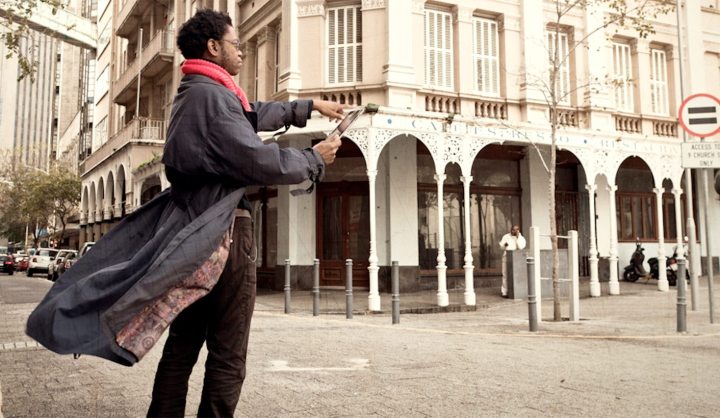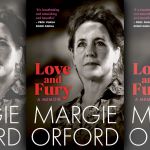Maverick Life
Meet Neo Muyanga, Madiba Magic’s operatic translator

Sitting in the garden, the sunlight is making it one of those perfect Johannesburg spring days – just right for a wide-ranging conversation about art, music, life, death and everything. Neo Muyanga, the man commissioned to compose the newest opera that will explore Madiba magic, is explaining where his musical inspirations and his musical ideas come from. It is a complicated business, it seems. J. BROOKS SPECTOR talks with the composer about his work, his life, his dreams, and even his fears.
Muyanga grew up in Soweto in the midst of the years of student unrest, rebellion and protest, and he narrowly escaped the fates of so many others from that period – the arrests, incarcerations, beatings and the rest. His parents packed him off to Bloemfontein; then it was Botswana. He then moved on to the United World College of Italy in Trieste to study philosophy and physics, but music eventually got its hooks into him and he fell in love with, wait for it, Renaissance madrigals. He explains that, for him, their intricate four-part harmonies were an echo of traditional South African vernacular singing styles. And it was love. But the twentieth century exerted its pull on him as well. Jan Sweelinck, Jimmy Hendrix, John Adams and Frank Zappa – all wound up together – with an electric guitar twist.
Chimurenga magazine says of him, “A son of the Muyanga clan (Chopi musicians and inventors of the musical instrument, the Timbila, Mozambique) and the Shembe clan (distant relation to Isaiah Shembe, prophet and founder of the Shembe church/liturgy, Zululand), it’s no surprise music has become his compulsion.”
Unlike much of what has been done to bring the Mandela story to stage and screen so far, his upcoming Mandela opera will not be a straight chronological narrative of a great man gazing off into the distance at a heroic future. “My quest is to find windows into the soul of what it means to go through that; then we’re finding the meaning, not just of Mandela, but the people he sacrificed on behalf of,” Muyanga adds. “I’ve been working this year on a film score, ‘Letter to Mandela’ and in a sense that has been an interesting window into the different perceptions, joys, veneration, people who think of him as almost saintly, and others who wonder what was sacrificed.”
There have already been two operas about Mandela, “The Mandela Trilogy” and “Winnie”, plus a growing number of movies (including the big one, ‘Long Walk To Freedom,’ due out shortly). All of them basically seem to take the brave, heroic posture as their starting point. “Yes, a singlehanded heroic, iconic tale”, Muyanga says. “But that is not the core of the tale I want to tell” in this opera.
To immerse himself in this challenge, Muyanga has been reading Mandela’s speeches and letters, and listening to recordings of his speeches, and Muyanga says he feels encouraged because there is so much material that gives him a close-up look at the man. Moreover, Muyanga reminds that he was a working broadcast journalist at the time Mandela came out of prison. As a result, he covered the unfolding Mandela saga of the early 1990s with a first-hand, close-up look as part of his work. Certainly useful background, but just as certainly, rather unusual, esoteric training for an operatic composer.
Talking about the grand opera tradition, we agree Umberto Giordano’s “Andrea Chenier”, a late 19th century work about a writer-hero of the French Revolution, is a wonderful model for how to tell a sprawling, heroic story. At that moment, Muyanga surprises just a bit when he says he has been giving that very work considerable study for inspiration in the crafting of the role of a heroic figure in a revolutionary time – for his own opera. The themes are similar; and the sense of historical energy is there too.
Talking more directly about his own music, he says he does pop and classical (he was also a popular performer in the acoustic duo, blk sonshine), but deep down in inside, he really sees himself as a 14th century composer who just happens to be living in the 21st century. For Muyanga, it is those clean melodic lines and the harmonies – they’re antiphonal, yes, but they are crisp and clear and can be heard beautifully. And the local South African vocal traditions are inspirations that, for him, make a connection to that earlier European musical tradition. These vocal traditions that influenced him also extend to the Frelimo songs, the Zanu-Pf songs of the liberation tradition, in addition to South African local music. All of these serve him as inspirations to draw upon this for larger orchestral textures that are part of his work in progress. Imagine for a moment, Neo Muyanga as a kind of 21st century version of Beethoven – wandering through the German countryside, notebook in hand, harvesting traditional German melodies as the raw material for his own works.
Muyanga’s face lights up when he says it is marvellous to live now and be able to burrow into the entire wealth of the world’s musical resources, including transcriptions of traditional music – like the famous Hugh Tracey collections as well as releases from the SABC’s Radio Bantu transcriptions. “I reference that music all the time” in his work, Muyanga says. And, speaking about the musicians involved in Todd Matshikiza’s “King Kong” – even back then, he says, those musicians had seen themselves as part of the world’s musical wealth, although growing up in the 1970s and 80s one no longer were able to gain that same sense of connections so easily because of South Africa’s growing isolation.
Thinking more about South Africa’s traditional music, Muyanga says he has now realized South Africa’s national instrument is the voice. As a result, his on-going work for this opera about Mandela is being guided by his desire to take this tradition and articulate its sensibilities for the orchestra. “I am excited about this. All of my work – the operetta work, the chamber music and story telling works – have been building up to this particular project. It is leading up to clarifying where the voice sits and leads – and defines the timbre of the orchestra…. For me, vocal writing that is four part vocal writing is the basis for any kind of large-scale composition. If you can be clear about where those four vocal parts should sit…you can pretty much tell where the [sounds of the] woodwinds, the brass, the strings should sit as well.”
As he agreed to work on this commission, he said he had some trepidation about it – the story he wanted to tell was what happened after Mandela left prison and how he had to bring everyone together for collective sacrifice in order to achieve any national healing. And, just as important, what all the different groups had to surrender in order to achieve anything – “and thus what is happening today and what is the legacy.” While he says it probably can’t end on the simple triumphal note of the inauguration speech, he still feels the need to figure out how to avoid a sad wailing moment. Instead, he says, “It needs to deal with my generation; we have to imagine what that triumph means for us.” “It’s about the meaning of Mandela, not simply a Mandela biography… although I don’t really know yet whether it ends on a triumphal note”, pointing out the fact that this opera is still a work in progress – he’s still playing with the ideas, themes and musical textures that will go into this work.
“Part of what I am doing is based on a libretto by Prof Temba Msimang which we are also vetting factually with the Nelson Mandela Centre for Memory… And my job is to stay on my straight and narrow path in responding to material that is out there, the public archive, much of it generated by Nelson Mandela himself.” Much of this material shows the vulnerable side of Mandela, but some of what he, Muyanga, will write will speak to what the Mandela saga means to the composer more personally. As far as the actual production itself goes, the idea over at Opera Africa – the organization that has commissioned this work – is that it will be on stage in September 2014, as part of a celebratory 20th anniversary year of the advent of non-racial democratic government.
We speak a bit about Philip Miller’s cantata, “Rewind” – another enormously symbolic work from South Africa. “Rewind” is about the Truth and Reconciliation Commission. We both agree “Rewind” is a powerful and evocative work, but Muyanga is unequivocal that his new work will be a full, dramatic opera – in contrast to Miller’s composition – in part because his characters will have real dramatic curves to their lives on stage rather than representing ideas, perhaps.
Muyanga says it is a great time to be a composer. There is a great amount of work being done and he feels he lives and works in a community of creative professionals that gives him inspiration and strength.
Conversation turns to the actual creative process – does he work from a textual story line or does he start with musical ideas and then figure out where that music might go in a story. Muyanga says he can actually go either way, in part because he has a significant amount of live theatre background – including several years with a theatre group in Nottingham in Britain. As a result, as he reads a text – especially if it is a metered one Shakespeare’s plays – he can already hear important musical ideas and textures. “I can’t actually explain where that comes from”, Muyanga admits. But in a work like this one, he knows he has to start with the overture. “The big question is: what am I hearing, what am I seeing? I have to see the lights; the smoke; is it convincing; is it dramatically convincing?”
And what kind of orchestration is Muyanga working with for his Mandela opera? He says he is working to put the music in a largely standard orchestra, along with some South African traditional bows. This will allow the work to be able to be performed anywhere in the world by any orchestra. There may be slight variations in technique to encompass traditional Xhosa or Zulu Masakandi music, as well as some electric mbira sounds – but, so far at least, no electric guitar – although this writer has cunningly planted the seed that just such an instrument belongs in this work as well. Unabashed, the writer has also asked to be allowed to be a spear bearer in the actual production. Muyanga laughs and agrees it is something that might be arranged. Excellent. DM
Read more:
- Research Residences at UCT at the university’s website
- Neo Muyanga Mp3 Downloads from Muyanga’s website
- Biography of Neo Muyanga at the composer’s website
- In The Listening Room with Neo Muyanga at Chimurenga
- My Day Job: Neo Muyanga | Composer at 10 and 5.com















 Become an Insider
Become an Insider